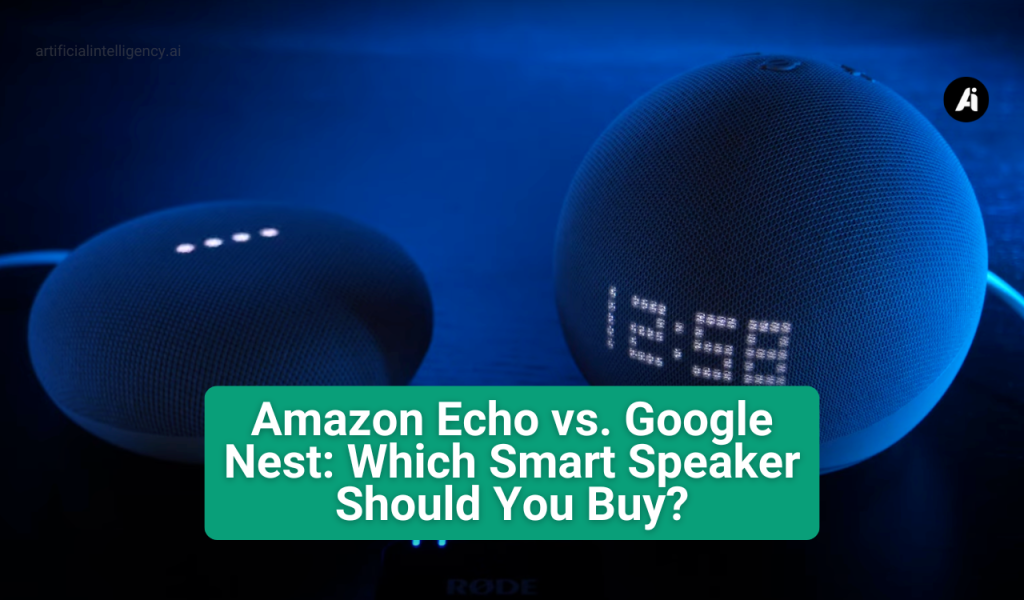Smart speakers have transformed modern homes, making daily tasks more convenient with voice commands, smart home automation, and entertainment features. But with so many options available, how do you choose the right one?
The battle between Amazon Echo vs. Google Nest has been ongoing, with both offering powerful voice assistants, seamless smart home integration, and innovative features.
Whether you’re considering a display-based speaker like the Amazon Echo Show vs. Google Nest Hub or a compact model like the Amazon Echo Dot vs. Google Nest Mini, selecting the right device depends on your ecosystem preferences, smart home setup, and desired functionality.
Ready to find the perfect smart speaker? Let’s explore the key differences:
1. Smart Home Ecosystem Compatibility
Smart home integration is a major factor when comparing Amazon Echo vs. Google Nest. Both devices offer powerful automation and voice control, but they excel in different areas.
Amazon Echo (Alexa) Integration
If you’re already using Alexa-enabled devices like Fire TV or Ring security cameras, Amazon Echo is a natural fit. It connects effortlessly with a wide range of smart home gadgets, including Philips Hue lights, Nest Thermostats, and TP-Link smart plugs. Alexa’s Routines take automation to the next level, allowing you to trigger multiple actions with a single voice command.
Alexa also supports a vast library of Alexa Skills, which lets you expand its functionality to suit your lifestyle. From controlling your smart home to checking the weather or ordering groceries, Alexa’s versatility makes it a robust choice.
For those considering display-based models, the Amazon Echo Show vs. Google Nest Hub comparison highlights Alexa’s superior compatibility with smart cameras, allowing you to view feeds from Ring or Arlo cameras directly on the screen.
Google Nest (Google Assistant) Integration
For those who rely on Google services like Calendar, Gmail, Google Photos, and YouTube, Google Nest is the smarter choice. Its deep integration with Google’s ecosystem makes scheduling, reminders, and streaming seamless.
If you have Nest products—such as Nest cameras, Nest Doorbells, or Nest Thermostats—Google Assistant works smoothly with them, creating a cohesive smart home experience. Google Chromecast users will also find Google Nest’s integration seamless for streaming content.
If you’re comparing display models like Amazon Echo Show vs. Google Nest Hub, Google Nest excels with visual search results and YouTube streaming.
2. Audio Quality and Music Performance
Sound quality is crucial when choosing a smart speaker, especially for music lovers. Both Amazon Echo and Google Nest deliver high-quality sound, but they differ in tone and performance.
Amazon Echo: Rich and Powerful Audio
Amazon Echo speakers feature Dolby processing, delivering deep bass and an immersive sound experience. They support major streaming services like Amazon Music, Spotify, Apple Music, and Tidal, making them ideal for music lovers.
Multi-room audio allows you to sync music across multiple Echo devices, and with customizable EQ settings, you can adjust the sound to your liking.
For those comparing Amazon Echo Dot vs. Google Nest Mini, the Echo Dot produces deeper bass and richer sound despite its compact size.
Google Nest: Balanced and Crystal Clear
Google Nest speakers focus on balanced sound with clear vocals, making them ideal for podcasts and casual listening. They integrate naturally with YouTube Music, Spotify, Pandora, and other platforms, ensuring a smooth streaming experience.
Google Nest also supports multi-room audio, and the Google Home app allows you to adjust sound settings to match your preferences.
If you’re considering display models like Amazon Echo Show vs. Google Nest Hub Max, the built-in speakers enhance music, calls, and video streaming experiences.
3. Voice Assistant Capabilities
A smart speaker’s true power lies in its voice assistant. Both Alexa and Google Assistant offer hands-free convenience, but they have unique strengths.
Alexa: Customization and Smart Home Control
Alexa is known for its fast responses and natural language processing. Its ability to recognize and respond to complex commands makes it highly versatile.
Alexa’s strength lies in its extensive customization options. Through Alexa Skills, you can create custom commands for specific tasks, set up complex routines, and integrate third-party services.
Alexa’s smart home compatibility is also broader, supporting a wide range of third-party smart home devices.
Alexa also works well with Fire TV and Amazon Prime Video, making it a strong choice for Amazon ecosystem users.
Google Assistant: Smarter and More Conversational
Google Assistant excels in understanding context and handling follow-up questions naturally. Its integration with Google Search provides more accurate and detailed responses.
Google Assistant also supports multiple languages and can switch between them seamlessly. For households with multilingual users, this makes Google Nest a more intuitive choice.
Google Nest integrates well with Google Maps and Google Calendar, making it ideal for setting reminders, finding locations, and planning daily routines.
4. Design and Build Quality
A smart speaker isn’t just a gadget—it’s part of your home decor. Both Amazon Echo and Google Nest feature modern designs, but their aesthetic approaches differ.
Amazon Echo: Sleek and Versatile
Amazon Echo speakers combine fabric and metal finishes, offering a modern look that suits various home styles. The Echo lineup includes a variety of sizes and colors, from the ultra-compact Echo Dot to the feature-rich Echo Show.
Larger Echo models focus on premium sound quality, while smaller versions prioritize space-saving without compromising performance.
Google Nest: Modern and Minimalist
Google Nest speakers have a soft fabric covering and a minimalist design that blends into contemporary spaces. The Nest Mini is compact and lightweight, making it easy to place anywhere.
The Google Nest Hub and Hub Max feature bezel-less displays, allowing them to blend naturally into any room without standing out.
If you prefer variety and customization, Amazon Echo offers more options, while Google Nest sticks to a unified modern aesthetic.
5. Privacy and Security
Privacy is a major concern with smart speakers, as they are constantly listening for voice commands. Both Amazon and Google prioritize user privacy but take different approaches.
Amazon Echo: Privacy-Focused Controls
Amazon Echo includes a physical mic-off button to disable listening at any time. Through the Alexa app, you can review, delete, and manage voice recordings.
Google Nest: Transparent Data Management
Google Nest includes a mic switch to disable listening when needed. The Google Home app allows you to manage your voice history and delete past commands.
Both brands offer solid privacy controls, but Amazon Echo gives more direct control over stored voice data, while Google Nest emphasizes transparency.
6. Price and Value
Price is a key factor when choosing between Amazon Echo vs. Google Nest. Both brands offer models at various price points, catering to different budgets.
- Amazon Echo Dot vs. Google Nest Mini – Affordable and compact
- Amazon Echo vs. Google Nest Audio – Mid-range models with improved sound quality
- Amazon Echo Show vs. Google Nest Hub Max – High-end models with displays for video calls, smart home controls, and entertainment
Which One Should You Buy?
Best for Amazon Prime and Alexa Users – Amazon Echo is ideal for Alexa users and Amazon Prime shoppers. Its deep integration with Amazon services and broad smart home compatibility make it a strong choice for smart home automation.
Best for Google Ecosystem and Android Users – Google Nest works best for users already relying on Google services like Calendar, Gmail, and Chromecast. Google Assistant’s superior contextual understanding and language support make it highly intuitive.
Audio Quality or Smart Home Compatibility – The Deciding Factor
- If audio quality matters most → Amazon Echo (Dolby-enhanced sound and deeper bass)
- If smart home compatibility matters most → Amazon Echo (broader third-party support)
- If seamless Google ecosystem integration matters most → Google Nest
Final Thoughts
Both Amazon Echo and Google Nest offer impressive smart speaker experiences. Amazon Echo excels in smart home automation, audio quality, and Amazon service integration.
Google Nest stands out with its superior voice recognition, search accuracy, and seamless Google service compatibility.
Your choice ultimately depends on your ecosystem, audio preferences, and smart home needs.
Author
-
I’m an AI SaaS expert passionate about simplifying complex tech. I explore and review AI-powered products to help you make smarter decisions.
View all posts



